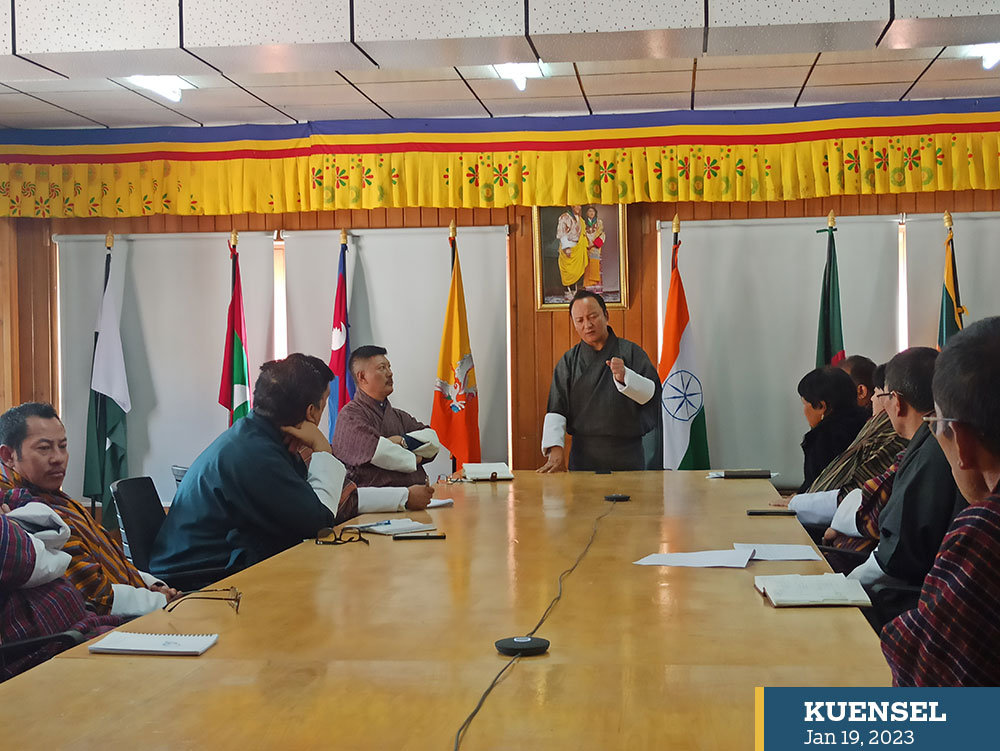Thukten Zangpo
The government cannot lift the observation period for loan accounts once it is under non-performing loans (NPL), Finance Minister Namgay Tshering said during the meeting with the members of the private sector yesterday.
As per the Royal Monetary Authority (RMA), the NPL that have become performing through repayments made by the borrowers have to undergo six months observation period with no bank guarantee and letter of credit.
The members of the Bhutan Chamber of Commerce and Industry (BCCI) yesterday expressed their desire to lift the six months observation period for the benefit of the private sector until the economy returns to normalcy.
The same issue was also submitted to the RMA for consideration on January 3.
“I support the RMA. There should be some compliance or financial discipline,” Lyonpo said, adding that the RMA as a regulatory authority, has the power to regulate.
However, he added that the government asked the RMA not to treat the different categories of NPL under the same basket. “There has to be a differentiated approach.”
Four categories of NPL are watch exposure (31 to 90 days), sub-standard exposure (91 to 180 days), doubtful exposure (181 to 365 days), and loss exposure (366 days and above).
Lyonpo said that the banks have staggering NPL because of no smart system with the banks, and banks lend loans without physically verifying the collaterals. The move is to make the financial service providers resilient and protect them, he added.
“As per the expert team review, if the NPL is not resolved, it would take not less than two year for the banks to go bankrupt,” Lyonpo said.
When the government took over, he added that Nu 26 billion (B) out of Nu 135B total loans were under NPL.
The government’s policy bank, Bhutan Development Bank Limited’s NPL ratio was 43 percent in 2018, Lyonpo said.
He also said that loans availed from the National Cottage and Small Industry Bank at two percent interest rate during Covid-19 were not used for the intended purposes, going into NPL.
Even a five percent interest loan for stocking up the essential items during the Covid-19 was used for procuring mobile phones, vehicles and land, Lyonpo said.
He also informed that the borrowers must have financial literacy or financial discipline.
However, BCCI’s President Tandy Wangchuk said that banks are not at all at risk since the banks keep the collateral while borrowing loans at 60 percent loan to value ratio.
He asked if the six months observation period could be enforced progressively, beginning from one month and to two months and even to a year, as and when the economy improves.
The Executive Director of the Construction Association of Bhutan, Tshering Younten, said that the NPL in the construction sector is because of a delay in the government bills which remains pending from six to eight months.
About 12 contractors were terminated from work for failing to produce bank guarantee.
He also said that the contractors have 10 to 20 percent deposit with the procurement agencies and without the bank guarantee, contractors are not able to take out the deposits.
He requested to provide at least three months’ time, in which the contractors can collect their bills from the government and clear the NPL.
A representative from the hotel industry said that with the change in the tourism policy and mandatory for the tourists to stay in three-star and above hotels, many hoteliers would go under NPL.
He said that the government encouraged them to come up with hotels initially by providing a 10-year tax holiday and free customs duty, which saw a booming hotel industry in the country.
The regional tourists are willing to pay Nu 1,200 per day sustainable development fee, a hotelier said. However, mandatory requirement for the tourists to stay in three-star and above hotels has resulted in fewer tourists visiting.
He added that there are 638 non-registered hotels and 90 percent of these hotels survive on the regional tourists.
Lyonpo responded that the government is aware of the situation, and the government has already cautioned the RMA and banks. “If the problem prolongs, there should be remedial and corrective measures.”
The Chamber also asked to revise the loan-to-value ratio of assets by the banks that were valued 10 years ago to help businesses get additional loans on the collaterals.
Lyonpo said that the government is consolidating the Property Assessment and Valuation Agency rate, which would be submitted to the RMA, and banks can use it uniformly.


